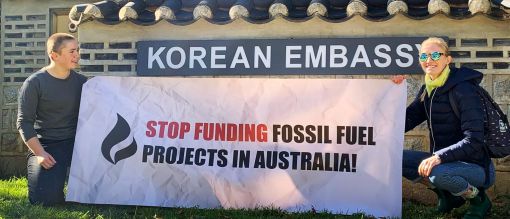Canberra, Australia - Today, the Australian Youth Climate Coalition, in conjunction with the Environment Centre NT and Jubilee Australia Research Centre organised a protest outside the Korean embassy calling on Korea to stop funding fossil fuel projects in Australia. Korean public financial institutions have provided more than AUD4 billion to gas projects in Australia over the last decade. Of particular concern is the AUD200 million support towards the Barossa gas project in the NT, which could be one of the dirtiest gas projects in the world.
Korea's continuous support for fossil fuel projects in Australia is inconsistent with Korea's commendable recent steps towards becoming a true climate leader, including its announcement of the 2050 carbon neutrality goals and the official moratorium on overseas coal financing. More importantly, it does not align with recent international moves away from fossil fuels. Only last week, the IEA published its ground-breaking report calling for an end to fossil fuels, and the UK won backing from Italy for a proposal for G7 to end fossil fuel subsidies.
Dina Hopstad Rui, Campaigns Director, Jubilee Australia, said:
Concerned Australians have come out today to ask the Korean government to reconsider its $250 million dollar funding for the Barossa-Caldita gas project – one of the most carbon-intensive gas projects in history – and to stop funding Australian fossil fuels altogether.
We call on the Korean Government and Korean public financial institutions to stop providing financial support for fossil fuel projects in Australia. We also call on the Government to reconsider its support of the Barossa-Caldita gas development project. Instead, we hope that Korea can continue its journey to becoming a green powerhouse by accelerating a just and equitable energy transition.
Sejong Youn, director of Climate Finance, Solutions for Our Climate (South Korean NGO), said:
We support this peaceful protest organised by Australian Climate Groups and their ask for the Korean Government to stop funding fossil fuels and reconsider its support for the Barossa project.
Investing in new gas project is inconsistent with the 2050 net-zero target, as IEA pointed out in the recent report. Korean public financial institutions must immediately stop funding new fossil fuel projects and establish a concrete plan to align themselves with the global climate goals.
Jason Fowler, Marine Scientist engaged by ECNT with respect to the Barossa project, said:
The Barossa project and its infrastructure are located in some of the most pristine waters in Australia. Santos’ pipeline will cut through the Oceanic Shoals Marine Park and pass mere kilometres from the Tiwi Islands themselves.
This project will have devastating impacts on biodiversity in the region, including on critical habitat for the threatened Flatback and Olive Ridley turtles. It could also cause two of Australia’s most important tropical fisheries to lose access to important fishing grounds, and come under increased risk of seismic testing impacting fish stocks.
-
##
Media Contacts:
General enquires:
Dina Hopstad Rui, Campaigns Director, Jubilee Australia
The Barossa project:
Kirsty Howey, Co-Director, Environment Centre NT
About the organisations
Jubilee Australia Research Centre (https://www.jubileeaustralia.org/)
The Jubilee Australia Research Centre engages in research and advocacy to promote justice for communities impacted by the Australian corporations and government agencies. We are the leading Australian organisation working to end public finance for fossil fuel exports.
Environment Centre NT (https://www.ecnt.org.au/)
The Environment Centre NT (ECNT) is the peak community sector environment organisation in the Northern Territory. We have been working hard to protect the Territory environment since 1983. ECNT is lobbying for a strong Climate Policy for the Territory, including a net-zero emissions target by 2050 and a ban on shale gas fracking. ECNT advocates for the protection of the unique Territory landscapes and biodiversity. This includes strong environmental legislation, including stronger laws for land clearing and mining rehabilitation.
